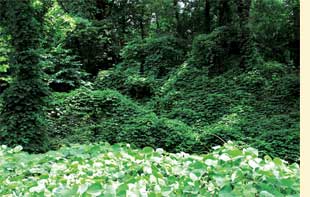U.S. and China Collaborate on Invasive-Species Studies
New grant will address how species from each country
manage to invade the other
What began as a breakfast-table discussion between two UGA professors has led to a grant, from the Program in International Research and Education of the National Science Foundation, to study how various species from China have become invasive in the United States—and vice versa.
The project was the brainchild of Rodney Mauricio, an associate professor of genetics, and Karin Myhre, an assistant professor of Asian languages. Myhre and Mauricio, who met through the Lilly Fellows Teaching Program, are husband and wife.
“Invasive species—one of the consequences of globalization—are among the most pressing conservation issues of our day, and we have leveraged considerable local scientific talent to address this crisis,” said Mauricio. “Our research team will use forensic techniques to study the genetic structure and population of 10 species: five native to China and invasive in the United States, and five native to the United States and invasive in China.”
 In addition to deploying teams of researchers from both countries, the project will also provide students with training opportunities in China. A number of new assistantships will be available for UGA graduate students, who will work on ecological genetics. The grant will also support 10 American undergraduates per year to participate in an eight-week summer field course and research internship in China.
In addition to deploying teams of researchers from both countries, the project will also provide students with training opportunities in China. A number of new assistantships will be available for UGA graduate students, who will work on ecological genetics. The grant will also support 10 American undergraduates per year to participate in an eight-week summer field course and research internship in China.
Numerous other researchers and teachers are involved in the $2.5-million grant, including many from UGA, which already has established groups to study specific invasive species. In addition to Mauricio and Myhre, UGA faculty members include plant biologists Jim Hamrick and Shu-Mei Chang and plant pathologist Ron Walcott. All three are in the College of Agricultural and Environmental Sciences.
Many people may be surprised by the number of invasive species from China that are presently found in the southern United States. Wisteria, privet, and honeysuckle are all Chinese natives that found a welcome foothold in the South’s climate. None of these is remotely as well-known as China’s coiling stealth dragon: kudzu. Plants aren’t the only invaders, though. Snakehead fish, Asian tiger mosquitoes, and Formosan termites are just three of the Chinese animal species that flourish in the States as well.
While wisteria is lovely in bloom, and kudzu helped reclaim land after massive erosion from poor farming practices, invasive species are largely seen as serious problems. Indeed, in the United States alone, the estimated annual cost in agricultural losses, ecosystem damage, and control methods exceeds $137 billion.
Moreover, “plants and animals native to the southeastern United States have become serious invasive pests in China,” said Mauricio. “This shouldn’t be surprising, as these areas share a number of biological, geographic, and climactic characteristics.”
Studying invasive species has been a challenge, though, because it is often hard to coordinate research across international borders. “To really understand the biological basis of invasiveness,” he said, “we must study the species both in their native habitats and where they have become invasive.”
For more information, contact Rodney Mauricio at: mauricio@uga.edu
 |

